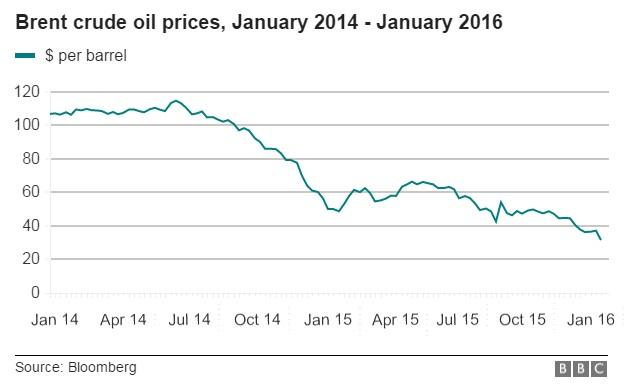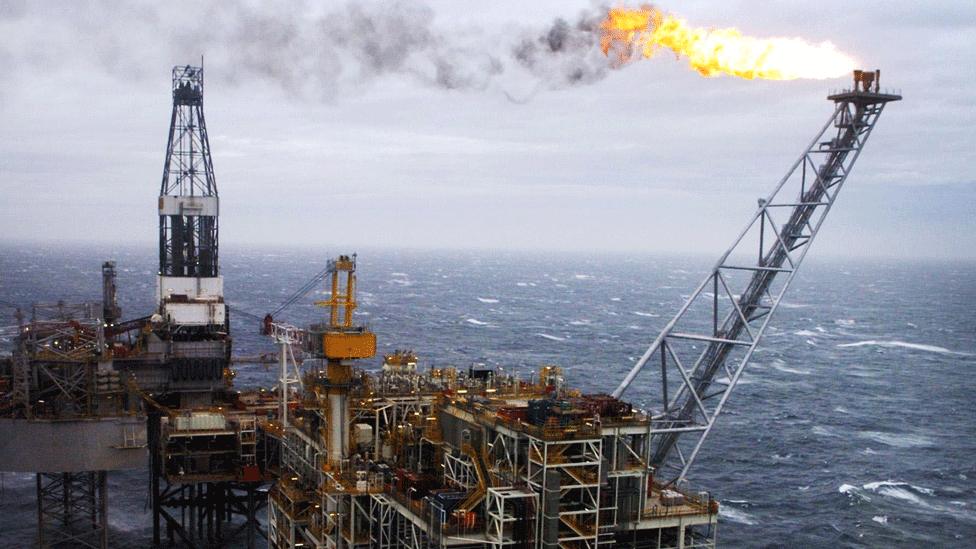Oil workers urged to seek help over mental health amid downturn
- Published
Aberdeen has relied on the oil industry for decades
The growing numbers of job cuts in the oil industry is having a dangerous impact on the mental health of some workers, according to a support group.
More than 700 job losses in the sector have been announced this week alone.
Industry body Oil and Gas UK estimates more than 65,000 jobs have already been lost as a result of the tumbling price of oil.
Suicide prevention body Choose Life, external told BBC Scotland it was vital those affected sought help.
On Tuesday, BP announced it was set to cut a fifth of its North Sea workforce - hitting about 600 jobs. The day before, Petrofac said it would shed 160 posts.
Economists said the drag on the Scottish economy was largely due to the effects of the falling oil price.
Neil Murray, the Choose Life co-ordinator for Aberdeen and Aberdeenshire, met some of those affected at a recent employment fair.

Neil Murray, of Choose Llife, said a "worrying trend" was developing
He said: "I was absolutely struck by the impact that the downturn in oil and gas had had on people who were attending that event.
"To be honest I saw people who were in shock and were in trauma, some people were facing redundancy, others had been unemployed for some time, and others were still in the industry but feeling very insecure.
"It wasn't all people who were in highly-paid jobs, it was people right across the board.
"What really struck me was the impact that the threat of losing your job or the effects of actually being unemployed was having on them.
"It's a way of life and it takes up such a big chunk of your life, which is not unique to the oil industry I have to say, but historically the industry has done well and I think a lot of people could not foresee this coming.
"They felt they were in very secure employment, and when the rest of the UK had suffered downturns Aberdeen has really fared quite well."

Jobs fairs are being held to help
He added: "There are indications that what is happening in the oil and gas industry is impacting on our suicide figures.
"This is a worrying trend.
"As part of the Choose Life group and community we target the north east of Scotland to try to get the message out there.
"It's OK to talk about suicide and especially it's OK to go and seek help when you need it."
'Wee boy's worth more'
One oil worker who lost his job in September spoke on the condition he was not identified.
He told BBC Scotland: "I came out the job fair that day and I just burst into tears and I thought 'sod it' I'm going for a swim, I actually thought of topping myself, until I saw my little boy's picture on my phone and that sort of brought me back to earth.
"I was bursting into tears every now and again and crying, me and my wife were arguing and were at each other's throats.
"I just sat there and thought I am worthless.
"I said to myself the wee boy's worth more than that, so I ended up going for counselling. The counsellor, she was absolutely fantastic."
'Do it'
Asked about counselling, he said "I would say do it. You are just bottling it up. It's just going to explode.
"It's quite a dark thing, there are a lot of people hiding it, and it's going to get worse.
"There are a lot of people caught in the money trap - the offshore money trap, big houses, big cars, that is where they are caught."
Aberdeen-based Jake Molloy, from the RMT Union, said: "They are broken, a lot of them are seriously hurt by it, husbands and wives sitting crying in cars, and lives completely in ruin.
"It's very difficult, and I know that a few of them are struggling and are seeking support with the problems they are facing - financial problems, relationship problems.
"To me the obvious elements are depression, this feeling of being left isolated, vulnerable."

Oil prices - key questions answered

Why is the oil price so low?
Oil prices have fallen by about 70% in the past 18 months as supply has outstripped demand. The demand for oil from China has fallen as its economic growth has slowed. Meanwhile supply has increased, partly due to the rise of US shale oil. In addition, the world's largest exporter of oil, Saudi Arabia, has refused to cut production - something it has done previously to support oil prices. Analysts estimate that about one million barrels of oil are being produced above demand every day.
Who benefits?
Consumers and some businesses have benefitted from lower oil prices. UK motorists have seen the price of petrol and diesel fall from about £1.40 a litre 18 months ago to about £1 now. Transport operators and airlines should also be benefitting from cheaper fuel. The lower fuel costs have also helped to keep inflation close to zero in many countries.
Who suffers?
Oil exporting nations that rely on a higher oil price to break even are suffering, such as Russia, Nigeria and Venezuela, as are oil firms generally. There have been thousands of job losses in the North Sea's oil industry. Investment in exploration has also been cut by big oil firms such as Shell, BP, Total and Exxon Mobil.
For details of organisations which offer advice and support, call the BBC Action Line to hear recorded information on 08000 934 999. Lines are open 24 hours and calls are free from landlines and mobiles.
- Published14 January 2016

- Published13 January 2016

- Published12 January 2016

- Published16 September 2015
